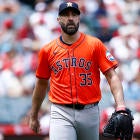Over the years, Hall of Fame voters have dinged countless players for being "accumulators," or for being too one-dimensional. That Omar Vizquel has evaded those brickbats en route to engendering genuine support for his induction into Cooperstown is a more impressive agile display than anything he ever did on the field.
The argument in favor of Vizquel is simple: He was a high-quality defensive shortstop for a much longer time than anyone has the right to be. He won 11 Gold Glove Awards across his 24 big-league seasons, along the way setting a new record for games played at the position. Baseball-Reference's historical defensive data suggests he earned nearly 13 wins based on his fielding ability alone. Included in that total is when he saved 16 defensive runs at 40, an age when most have retired or moved over to a position where their bodies aren't tested as much.
The argument against Vizquel is also simple: For all his longevity, he failed to exceed any of the magical thresholds. He didn't reach 3,000 hits or 500 home runs -- heck, he didn't reach 100 home runs -- or any other offensive number of note beyond 400 stolen bases. He probably would have recorded his 3,000th hit had he been marginally better over the last five seasons of his career. Instead, he posted an OPS+ below 60 in three of those. The result was, in an amusing twist, a career 82 OPS+ that equals Rabbit Maranville and Luis Aparicio, two of the worst hitters in the Hall who are there because of their perceived defensive ability.
The difference between Maranville and Aparicio and Vizquel is that the latter is being considered at a time when analytics are more prevalent and accessible. The others were deemed worthy when the eye test was the only judge in town. Don't get it twisted: Watching the players is necessary for gaining a full appreciation of their talent -- particularly when it comes to defense, as public metrics are so flawed as to potentially offer negative value. Still, the eye test is fallible, too. Was Vizquel really better than Mark Belanger? Was he on the same level as Ozzie Smith? Did he match Maranville and Aparicio? Only God knows -- truly, since no person could have seen them all in their full glory.
Turning to numbers reduces Vizquel's case. The one metric most voters will look at -- the aforementioned data housed at Baseball-Reference -- supports the notion Vizquel was a fantastic fielder. Even so, that isn't enough to put him in the Hall based on the JAWS methodology. In fact, his WAR total checks in below contemporary shortstops, like Miguel Tejada and Jimmy Rollins -- and no one seems hellbent on inducting that pair.
Not all analyses conclude that Vizquel was an elite-level fielder, either.
In Wizardry, a wonky book about quantifying defense, author Michael Humphreys notes Vizquel "made only 23 more plays than expected from 1993 through 2007" based on a methodology that compared the team's performance with and without Vizquel on the field. Humphreys later concluded that even if Vizquel's defense did equal Ozzie Smith's, the rest of his game was so lackluster that "it is clear that Vizquel should not be in the Hall of Fame." More than a decade earlier, Bill James wrote in the New Historical Abstract that Vizquel was a "very good defensive shortstop" but that "whether he is actually the glove magician reflected in Gold Glove voting is a question capable of debate." James, true to his character, was skeptical.
The Hall of Fame voting system often requires writers to go a step beyond skepticism, to cynicism, when it comes to players who aren't quite worthy of induction. Vizquel's support is such that his shortcomings as a player will be talked about more than his impressive glove and longevity. That's a shame. Vizquel deserves to be commended and his highlights deserve to be enjoyed. He staved off Father Time for much longer than any other shortstop had, coming as close to immortality as one can without achieving it. Unfortunately, the world operates on a binary system: you're either immortal or you're not; you're either a Hall of Famer or you're not.
Vizquel is neither, but that's true of most.






















